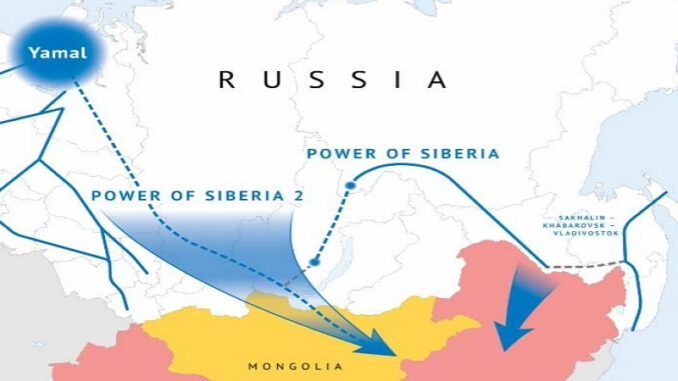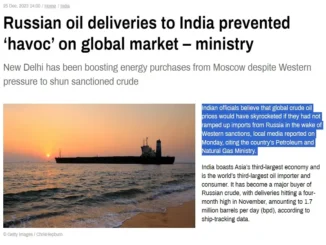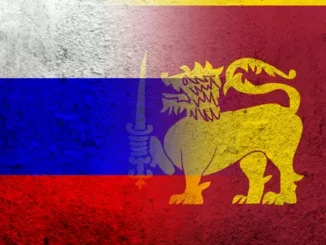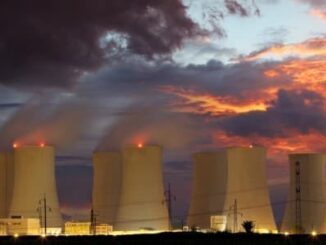
ENB Pub Note: I published Russia Wins in China with New Pipeline on September 2nd, and this article from Andrew Korybko’s Newsletter on Substack has some additional key points. We warned President Trump not to listen to the war mongers in Congress, and the two critical parts the main public is unaware of are how we got here, and that all Putin has to do is nothing to win the war. I am writing a longer article on how we got here later this week, and Putin is waging a war against the Bank of London and a few others. MI6 and the CIA installed Zelesky, and the Ukrainian people lost their freedoms long ago. Zelensky and his controllers canceled the elections. President Putin is right to ask for elections to happen, and when you see the ordered list of how we got here, it all starts to make sense.
The other critical part of these stories is that President Putin stated in a speech that the gas intended for the EU will now be allocated to China under contracts. He does not have to deal with sanctions or being bullied. The other side of this is that there will be a stark realization that the EU’s push for green energy and its decision to install Zelensky will be two of its worst decisions ever made.
Back to President Trump’s listening to the war mongers. There was potential for new trading blocs to emerge. Those following the path of energy freedom, and using energy sources that do not require subsidies and can grow economies, or they can follow Net Zero into fiscal decline and deindustrialization. The UK, the EU, and Canada are on a path to financial failure through Net Zero and deindustrialization. Saudi Arabia, Russia, India, and other Asian countries could have formed a new trading bloc. There is still time for President Trump to get his deal-making machine or mojo back into the game, but he has to stop listening to war mongers. President Trump’s overstepping on India’s decision to buy cheap Russian gas has backfired and will impact the US Dollar. We recommend subscribing to Andrews’s Newsletter.
Trump’s escalatory signals in Ukraine, the Indo-US split that he induced, and the attendant alleviation of the Sino-Indo security dilemma freed Russia up to clinch the long-negotiated Power of Siberia 2 deal.
Trump’s Eurasian grand strategy has sought to preemptively avert Russia’s potentially disproportionate dependence on China in order to avoid having its natural resources turbocharge the superpower trajectory of the US’ only systemic rival. In pursuit of this, the US envisaged entering into a resource-centric strategic partnership with Russia upon the end of the Ukrainian Conflict, expecting that this shared goal would incentivize Putin into agreeing to significant territorial and/or security concessions.
Trump’s unwillingness or inability to coerce Zelensky into any of Putin’s demanded concessions paired with increasingly concerning reports about plans to deploy NATO to Ukraine to spook Putin into ditching his balancing act and pivoting to China. The successful clinching of their long-negotiated deal over the Power of Siberia 2 gas pipeline, which will nearly double Russia’s gas exports to China to ~100 bcm a year and at a cheaper price than the EU receives, signifies the failure of Trump’s Eurasian grand strategy.
Putin might have held out for longer had Trump not inadvertently catalyzed the incipient Sino-Indo rapprochement via his hypocritically punitive tariffs that aim to derail India’s rise as a Great Power. That spooked India into patching up its ties with China, which alleviated their security dilemma that the US was exploiting to divide-and-rule them. This in turn reduced India’s worries about closer Russian-Chinese energy cooperation that it previously feared could lead to Russia becoming China’s junior partner.
It was never officially voiced, but astute observers and those who’ve talked to Indian thinkers know that India was worried that China might leverage its influence over Russia to get it to curtail or cut off military exports to India, therefore giving China a pivotal edge in their border dispute. The Trump-induced Indo-US split and attendant alleviation of the Sino-Indo security dilemma freed Russia up to clinch the Power of Siberia 2 deal without fear of spooking India into the US’ arms and thus dividing-and-ruling Eurasia.
The growing convergence between BRICS and the SCO, which aim to gradually reform global governance via their complementary efforts to accelerate multipolar processes, is due in no small part to India’s embrace of both in response to new strategic threats from the US. Prime Minister Narendra Modi’s first visit to China in seven years to attend the SCO Leaders’ Summit, during which time he held an important bilateral meeting with President Xi Jinping, is expected to lead to a new normal in Sino-Indo ties.
The roots of their tensions haven’t been resolved, but Russia expects that they’ll now be better managed, ergo why it clinched its deal with China over the Power of Siberia 2 gas pipeline right after also concluding that the US won’t try to help it obtain any of what it wants from Ukraine. To review, Trump signaled escalatory intent in Ukraine reportedly as the quid pro quo for the US-EU trade deal and then Sino-Indo ties improved as Indo-US ones worsened, thus making Power of Siberia 2 politically possible.
Trump’s foreign policy towards Eurasia has therefore indisputably failed. His team’s misguided approach towards Russia and India in demanding too much of them led to those two and China working out their differences, which exist amongst themselves bilaterally but also regarding their ties with the US, and consequently accelerated multipolar processes at the expense of the US’ unipolar interests. The Rubicon has clearly been crossed after this latest pipeline deal and it’s anyone’s guess how the US will respond.
Avoid Paying Taxes in 2025
Crude Oil, LNG, Jet Fuel price quote
ENB Top News
ENB
Energy Dashboard
ENB Podcast
ENB Substack






